$0.32. That’s the tiny amount Facebook used to earn off each user in the developing world at the beginning of 2012. It was understandable. Many of the citizens of India, Brazil, and Mexico don’t have a lot to spend.
That was hard on Facebook’s bottom line. These people’s homes didn’t have high-speed mobile networks or them couldn’t afford them, which meant loading the ad-filled News Feed was an agonizing experience. They were on feature phones or older smart phones with small screens so ads didn’t look that enticing.
And some simply didn’t have the buying power to purchase what advertisers typically sold in other markets.
The problem was that Facebook was already hitting user saturation in many of its core markets like the United States, Canada, and England. There just weren’t that many people left to register. Facebook’s user growth prospects were firmly in the “Rest Of World” region, but these signups weren’t generating enough revenue.
This, and the looming shift to mobile, spooked investors and caused Facebook’s IPO to tank. Its share price slipped to around $19.
4X 2012
Yet in the years since, Facebook has executed a remarkable shift in focus. Instead of building for wired populace surrounding its California headquarters, it started thinking about what would make Facebook a great experience in tiny towns on the other side of the planet. For people with different phones, different carriers, and different wallets.
The result was made clear last week in Facebook’s blockbuster Q4 2015 earnings report. The social network now earns $1.22 in average revenue per user (ARPU) in the “Rest Of World” region made up of developing nations. That’s almost 4X what it was earning in 2012. It’s made huge headway this year, growing that figure 29.8% compared to both Q3 and 2014’s strong holiday quarter.
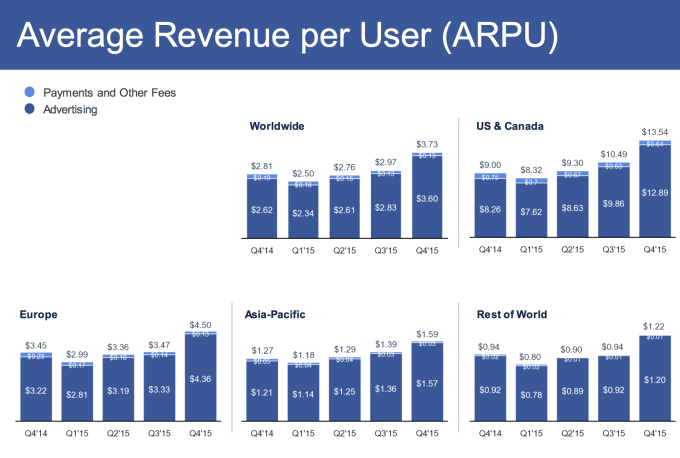
Sure, it’s nowhere close to the $13.54 ARPU Facebook makes in the US & Canada, or the $4.50 in Europe. But it’s rapidly catching up to Asia-Pacific. And with Facebook pouring resources into connecting “the next billion”, largely in the developing world, Internet.org and Facebook’s growth efforts stop being charity work to open the knowledge economy. They’re clear paths to revenue that can fund Facebook’s big bets on virtual reality, artificial intelligence, and more.
Building For The Next Billion
Smarter Day By Day
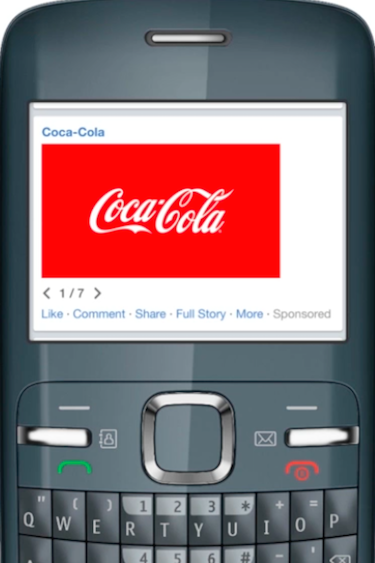 Time is on Facebook’s side. The natural virality and utility of Facebook inevitably pushes people to join. For the early adopters in a country, the News Feed isn’t that interesting because the folks they care about aren’t sharing there. But friends nag friends to join, and when they do, their News Feeds become more addictive. They visit more often so they see more ads.
Time is on Facebook’s side. The natural virality and utility of Facebook inevitably pushes people to join. For the early adopters in a country, the News Feed isn’t that interesting because the folks they care about aren’t sharing there. But friends nag friends to join, and when they do, their News Feeds become more addictive. They visit more often so they see more ads.
Similarly, time spent on Facebook teaches it what people want to see. From Liking Pages of businesses to commenting on posts about news stories to adding info to one’s profile, Facebook gathers more and more data to fuel its ad targetng. That means each ad people see is more likely to do its job, and advertisers pay a higher rate.
Facebook turns 12 next year, and has been open to everyone in the world since 2006. Venture capital and the money earned in core markets let it play the long game abroad.
Engineering With Empathy
Facebook is also building differently, with an emphasis on speed despite slow connections. The faster Facebook loads, the less frustrating it is to use. That leads people to open it even when they only have a few seconds, and spend longer sessions scrolling the feed, messaging, and using all of Facebook’s other features.
Facebook acquired Snaptu in 2011 and turned it into Facebook For Every Phone, an app for feature phones that simulated the smartphone experience. No matter what device people were on, they could access what felt like the real Facebook. By 2013, Facebook For Every Phone had 100 million downloads and was serving ads.

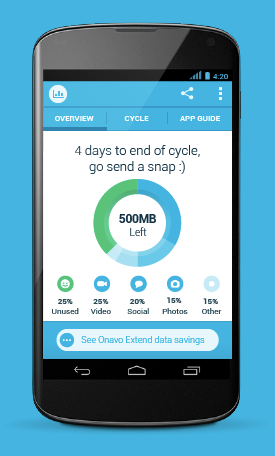
Facebook also bought a way to shrink its data and battery usage in 2013. The tech from its acquisition of Israeli startup Onavo made its apps faster, burn less of people’s data plans, and not kill their phones. That allows Facebook to be more affordable and convenient so people use it more.
The company ramped up its empathic engineering efforts with the creation of the Internet.org Innovation Lab in 2014. It lets Facebook and other companies simulate poor network conditions from the developing world to figure out how their apps work, or more often don’t work, when data slows to a trickle.
To force a sense of compassion on its employees, Facebook instituted ‘2G Tuesdays’ at its Menlo Park headquarters last year. Workers have to access Facebook over sluggish 2G connections common in the developing world so they know the pain of those users and strive to make the app run more smoothly.
Access Is Step One
Internet.org harnesses Facebook’s philanthropic intent to work on connecting the whole world. Facebook insists that monetization isn’t the purpose of its accessibility initiatives. But an inevitable side effect is that if Facebook unlocks the web for someone, they’ll likely make it their social network of choice.
Eventually, getting more people a reliable, affordable Internet connection is likely to generate revenue for Facebook. Ubiquity also drives network effect. Those might take a long time to offset the fortune Facebook is investing in bringing the rest of the world online.
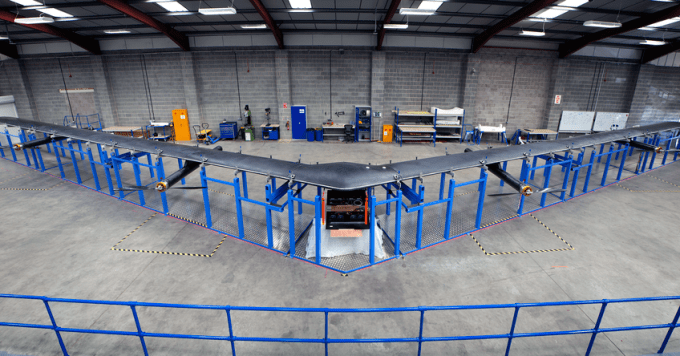
Facebook began building solar powered drones and lasers to deliver Internet access to remote areas. These aren’t flying in the field yet, but Facebook has begun testing its Aquila drones that could eventually give people out of range of cell towers a connection so they can educate themselves, communicate…and eventually use Facebook more.
Facebook also released its Internet.org app last year, and it’s now available in 33 countries. It offers free data access to Facebook, Messenger, Wikipedia, health info, civic resources, and other websites. The app, now called Free Basics, has met resistance from net neutrality critics who see it as a way for Facebook to control what people access. But Facebook argues some Internet is better than none, and has shifted to create a more open platform for other apps to be accessible for free.
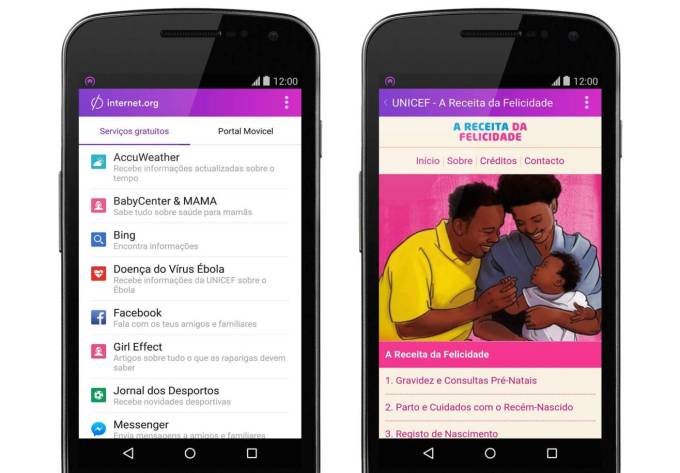
Over 19 million people have used Internet.org’s app to connect. Though it doesn’t show ads, it could convince people the Internet is worth paying for, including a version of Facebook that includes marketing.
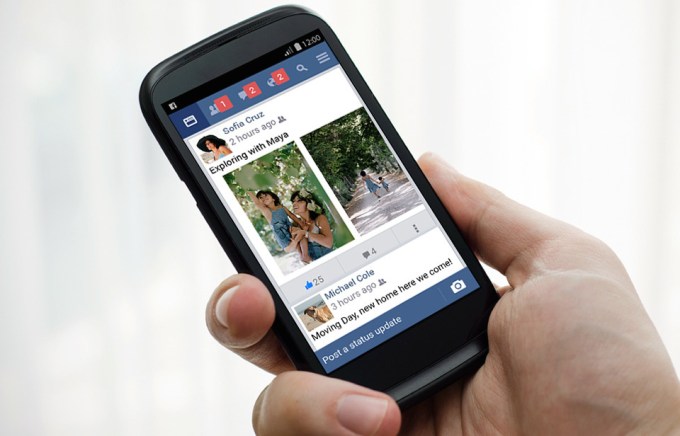
But even if someone can afford a data plan and are in range of connectivity, Facebook still wanted to make itself more convenient around the globe. In June 2015, Facebook launched Facebook Lite, a stripped down version of its Android app relying on what it learned about data crunching from Onavo.
The whole app is less than 1 megabyte, so it’s super quick to download. And by ditching videos and only pulling images in full-resolution when necessary, it loads fast on weak connections and is less likely to monopolize people’s data plans. The result is Facebook usage that is guilt free and won’t cost an arm and a leg. Ads aren’t as annoying when you’re not worrying about how much it’s costing you to see them.
Ads For Every Phone
All these efforts combine to set up a beach head for boosting ad revenue in the developing world. But Facebook is also attacking the problem head on.
Ads keep getting flashier and more data intensive in its core markets, but formats like HD video won’t fly in more remote areas. Users would get bored and scroll by before they finish loading.
Adapting To Locals
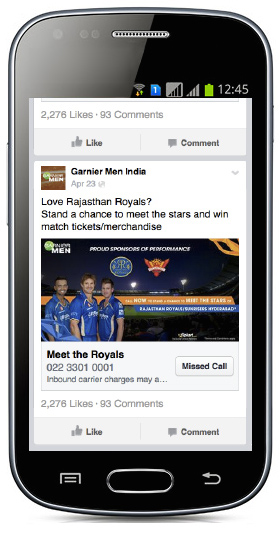
Starting in 2014, Facebook began offering bandwidth ad targeting. This allows marketers to show ads to people depending on whether they typically use Facebook over 2G, 3G, 4G, or LTE connections. This way, advertisers don’t waste money showing HD photo or video ads to users who won’t look because they load too slow.
Facebook also takes cues from unique local behavior patterns.
Facebook’s first foray into ads meant specifically for the developing world were “Click To Missed Call”. In India, outgoing phone calls are pricey. That’s why businesses often urge people to ‘missed call’ them. Potential customers call the business’ phone number but then immediately hang up before they answer so they’re not charged. The business can then call the person back at its own expense.
Facebook built ads that simulate this experience, giving the business the person’s phone number so they can call or text them with information that could inspire a purchase.
Videos Become Slideshows
To catalyze development of more of novel developing world ad strategies, Facebook launched the Creative Accelerator last year. It gives brands a chance to work directly with Facebook’s teams to build campaigns that are compatible with 2G connections, feature phones, and other old technologies.
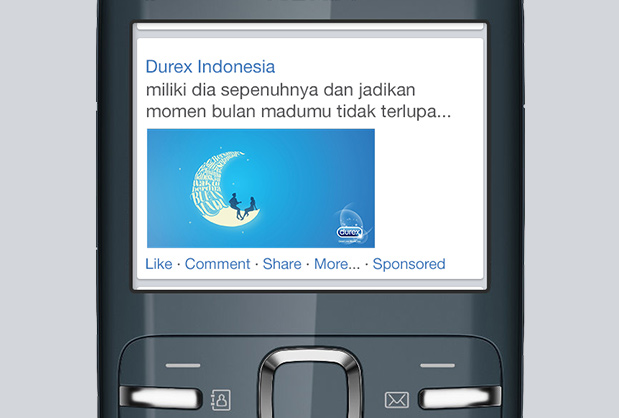
For example, Facebook worked with condom brand Durex on an ad campaign in Indonesia centered around a relatively low-resolution image that loaded fast on feature phones. Facebook also helped come up with text that meshed with different cultural norms around sex and birth control in the country. Brands who’ve worked with the Creative Accelerator have seen increases in ad recall and purchase intent.
Perhaps most emblematic of how Facebook is combining engineering and creativity to squeeze money out of the developing world is its new Slideshow ad format.
“The slideshow product enables a video-like experience with phones with lower connection speeds and feature phones with a series of photos” COO Sheryl Sandberg said on the recent earnings call. “Coca-Cola used that in Kenya and Nigeria. They took screenshots of a video ad they had produced for other markets. They uploaded them with text. And they reached 2 million people with a 10 point lift in ad awareness.”
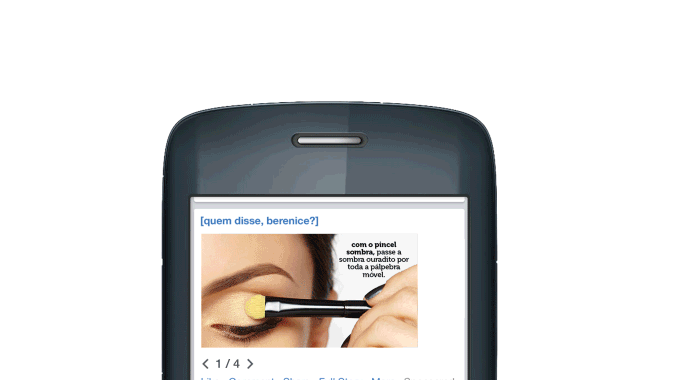
Essentially, video would take forever to load in these markets, so brands can cut their videos into what amounts to a storyboard. Through a few images with text, Slideshow ads can convey a similar story to full-motion video. Facebook tells me its seeing particularly strong interest in Slideshow ads in Brazil and India.
Still, Facebook is merely scraping the cash off the surface of the developing world. What its citizens lack in spending power they make up in spending time. Facebook’s user count in the Rest Of World region is growing almost 4X faster than in the US and Canada. And people there are using it more days per month despite that growth. 57.4% of monthly users in the Rest Of World used Facebook each day at the end of 2013, compared to 62.6% now.
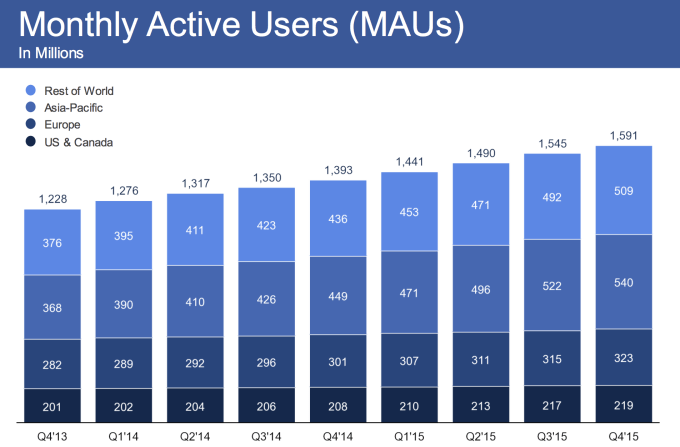
As Sandberg said on the earnings call, when you compare where people are placing their attention to where dollars are going, Facebook is “still under-indexed”. Time spent is shifting to digital and especially mobile faster than the advertising, but the media spend avalanche is starting.
That’s why through accessibility, engineering, targeting, and ad formats, Facebook is preparing itself. If it can make advertisers comfortable and while seducing citizens on slow connections, Facebook will increasingly turn pennies to dollars in the most unlikely places. Mark Zuckerberg wants Facebook to be the social utility. Utilities cost money. But Facebook has figured out how to let people around the world pay with their eyes.






























Comment